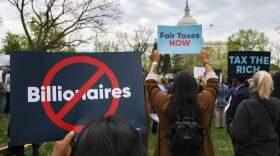Unresolved issues tied to education, incarceration and mental health services will hamstring Oklahoma’s ability to remain among the nation’s top 5 fastest growing economies, a panel of government officials and economists concluded during the Oklahoma Policy Institute’s 2nd Annual State Budget Summit.
On January 29, OPI Director of Policy Gene Perry led the panel through “An Economic Check-Up” of the state’s current economic conditions and fiscal policies.
Shelley Cadamy, the Executive Director of Workforce Tulsa, focused on the state’s low workforce participation rate and related challenges faced by job-seekers and employers.
“The problem is a mismatch in skills and education necessary for those jobs,” Cadamy suggested.
University of Central Oklahoma’s College of Business Dean Mickey Hepner echoed the point, saying that he doesn’t fear the future, but the state's lack of preparation for it.
“It’s not okay for Oklahoma to be 49th in the nation in teacher pay. It’s not okay for us to be 50th in the nation in the amount of per-pupil education funding changes in the past 5 years. It’s not okay for us to be among the nation’s worst uninsured rates. It’s bad for our businesses, it’s bad for our future,” Hepner said.
Oklahoma State University’s Regents Professor of Economics, Dan Rickman, uses an economic forecasting model that predicts Oklahoma City and Tulsa will continue to see slower growth than the national average due to the lack of college education.
“I’m worried we focus so much on energy, [that] we forget that there’s the rest of our economy, and I feel we’ve been neglecting that since the recession,” Rickman said.
Secretary of State of the Cherokee Nation, Chuck Hoskin Jr., remained optimistic about the future, citing investments in social and economic services for members of his tribe. Hoskins said the Cherokee nation uses 35 percent of profits from tribal gaming to provide tribal members subsidized housing, 12 weeks of paid maternity leave and an increased minimum wage of $9.50 that comes with health insurance and a 401(k).
“We see a great return on our investment because our people are rising up in their lives to see a brighter future,” Hoskins said.
He hopes Oklahoma’s local and state governments recognize the Cherokee nation as a successful model to emulate, but acknowledged the political difficulty of doing so.
“If the conservative media knew what we were doing, well, they’d be all over us,” Hoskins said. “I think they’d call us socialists… Don’t tell ‘em, by the way.”
Mental health funding, severe judicial punishment guidelines and high incarceration rates remained a priority throughout the panel’s discussion.
Cadamy linked mental health to the job market.
“In Oklahoma we fund mental health services at an abysmal rate. So for those of you who are employers, work with employers, or are legislators, know that it’s a workforce issue,” Cadamy said. “If we’re not going to offer mental health services, we’re not going to have the workforce to create wealth in Oklahoma.”
The lack of access to a robust mental health system could have long lasting effects on the workforce, as those who are ill and commit a felony face a much harsher job market.
“If your corporate headquarters is in Indiana, and your HR says, ‘We don’t hire felons,’ what they don’t realize is that in Oklahoma they’re crossing people off the list who… didn’t want to wait in line at O’Connell’s for the bathroom after a football game," Cadamy said. "They don’t get that."
Hepner agreed with that sentiment.
“It is abysmal, it is shameful, that we send so many people to prison for crimes that most states do not,” Hepner said.




